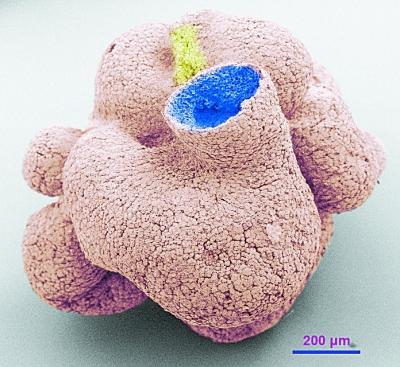World's oldest animal fossil found in China
- By Chen Boyuan
 0 Comment(s)
0 Comment(s) Print
Print E-mail China.org.cn, March 12, 2015
E-mail China.org.cn, March 12, 2015
Chinese scientists recently discovered a fossil of a primitive sponge animal believed to be 600 million years old, the oldest animal fossil in the world. The finding proves that sponges made their evolutionary debut 60 million years earlier than in the previously confirmed Cambrian Period (541-485.4 million years ago).
|
|
| 600 million-year-old fossil of a primitive sponge animal measures 2.5 cubic millimeters, almost the size of a grain of rice, and it looks like a chalice. [Photo / CNS] |
The discovery was published on Tuesday by Zhu Maoyan, a research fellow at the Nanjing Institute of Geology and Paleontology, a branch of the Chinese Academy of Sciences known as NIGPAS. The report says that the Weng'an Biota in southwest China's Guizhou Province was the location of the discovery, which would end the academic debate on whether there are in fact animal fossils in the Weng'an Biota.
The fossil's discovery is the fruit of years of effort -- researchers from NIGPAS have been going to the Weng'an Biota to collect samples since 2008. They found a rice-grain-sized fossil of an adult animal in phosphate ore and confirmed that it was 600 million years old, the first fossil of a so-called "adult animal" unearthed from the region. Zhu added that the fossil's age was determined by radiometric dating.
"The fossil measures 2.5 cubic millimeters, almost the size of a grain of rice, and it looks like a chalice," said Dr. Yin Zongjuin of the NIGPAS. "All signs confirmed that it is a fossil of a primitive sponge," he said, adding that the location of the discovery is noted in the fossil's name, "Guizhou Shibei ['first cup'] Sponge."
The Weng'an Biota drew international attention from academics in 1961 when scientists discovered the fossils of microorganism in the phosphate rocks in the region, but in the following decades, the fossils unearthed there were mostly zygotes and animal embryos. The fossils of adult animals occasionally discovered there, such as those of coelenterates, were never widely accepted by academia.
"The Weng'an Biota is some 600 million years old. It is comprised mostly of fossils of multicellular algae, large and barbed acritarches, and metazoan embryos. Metazoan embryos are empirical evidence of animals' origination and evolution prior to the Cambrian explosion," said Dr. Yin Zongjuin of the NIGPAS. He added that embryos, which haven't developed into concrete forms, play limited roles in research.
The Cambrian explosion of animals is already widely accepted as a hard fact evident in the fossil record, but animal fossils have rarely been found in the thick deposits from the pre-Cambrian Period. The discovery of this new sponge fossil in China has therefore provided valid evidence to the study of the period that led up to the Cambrian explosion, according to Yin.
The discovery of Guizhou Shibei Sponge will also enhance the Weng'an Biota's academic value, since it clarifies the origins of the previously unearthed animal embryo fossils.







Go to Forum >>0 Comment(s)